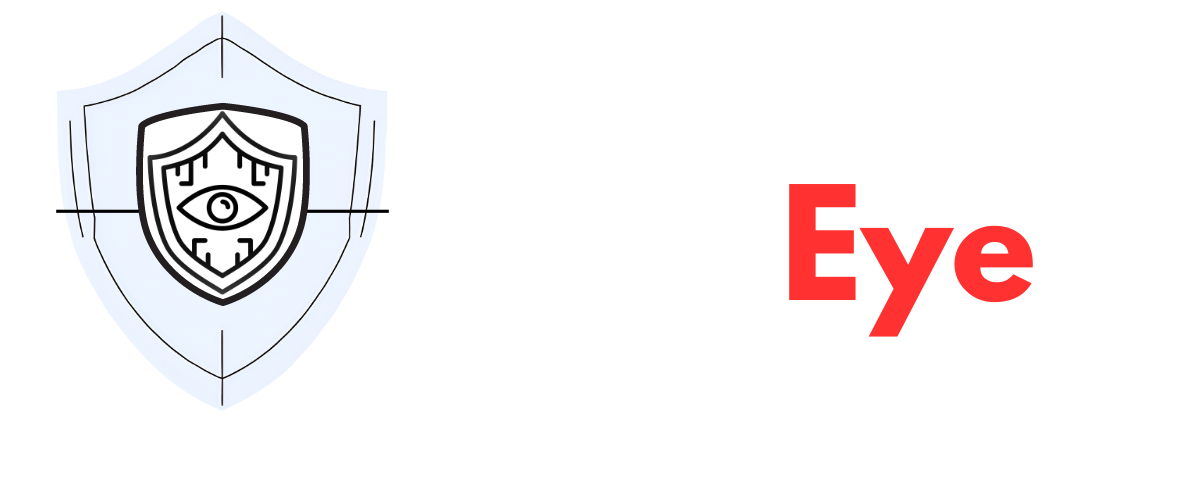Google Alert – Bangladesh Army
The July Foundation, established to support those killed and injured in Bangladesh’s historic July Uprising, now finds itself paralysed by a financial crisis just one year after it came into being.
Launched in the wake of the 2024 student-led uprising that toppled the Awami League government, the July Martyrs’ Memorial Foundation says it requires an initial Tk 40 billion ($339 million, £290 million) to support the families of the dead and wounded. But by the end of July 2025, it had received only Tk 11.94 billion ($97.8 million, £87 million), a shortfall that has stalled its planned operations.
When it was inaugurated last September, the foundation had outlined an ambitious programme: emergency financial aid for the injured, preservation of the memory of the martyrs, long-term rehabilitation, and counselling and mental health services.
However, most of these initiatives remain unrealised. The foundation has not yet reached all those in need, and those who have received support say the assistance is far from adequate.
Frustration over this has already turned violent. On Jul 8, a group of July fighters stormed the foundation’s office in Dhaka’s Shahbagh, expressing anger over delays in promised support.
“We have not yet reached a stable phase,” said the foundation’s Chief Executive Kamal Akbar, a retired lieutenant colonel of the Bangladesh Army. “All government institutions are assigned a digital budget code number, against which budgetary allocations are made. But we are not a government entity, so we have no such code. That’s a key reason we’re facing difficulty accessing funds.”
“We are currently receiving limited funding via the Department of Social Services,” he added. “But we hope for more in the future. Already, the Bangladesh Bank and 12 other banks have set up a fund to help cover the medical expenses of the injured.
“Some private donations are also coming in. We’ve written to the Ministry of Liberation War Affairs as well and expect support from there.”
FROM REFORM DEMANDS TO REGIME COLLAPSE
The July Uprising began as a student protest demanding reforms to the public sector job quota system. But it rapidly transformed into a nationwide revolt, culminating in the resignation and flight of prime minister Sheikh Hasina on Aug 5.
Initially centred at Dhaka University, the movement soon spread like wildfire across educational institutions throughout the country. The state’s response was one of unrelenting force — bullets, tear gas, batons. The government also shut down Facebook, and then the entire internet, in an attempt to stem the tide. But the clampdown backfired.
Within 20 days of the first bloodshed, the weight of coffins and casualties brought down the decade-and-a-half-old regime. Hasina fled to India.
According to an official government gazette published after the uprising, 834 people were killed and 13,811 were injured in the course of the July mass movement.
THE BIRTH OF THE JULY FOUNDATION
With thousands killed and wounded in the mass uprising, an urgent need for structured support led to the establishment of the July Martyrs’ Memorial Foundation on Sept 10, 2024. The foundation is chaired by Muhammad Yunus, chief advisor to the interim government, while martyred Mir Mahfuzur Rahman Mugdha’s brother, Mir Mahbubur Rahman Snigdho, was appointed as its first general secretary.
The foundation set out with a broad mandate: to raise funds globally in order to provide healthcare, financial assistance, education, employment, and business support to affected families.
It also pledged to preserve the memory of the fallen by installing commemorative plaques in each martyr’s name, launching national remembrance events, and developing a digital archive for future generations.
Importantly, the foundation does not directly spend money on medical treatment or rehabilitation. Those responsibilities lie with the Ministry of Health and Family Welfare. The foundation instead plays a coordinating role, bringing together various public and private organisations involved in recovery efforts.
Its core mission is to provide financial support to the families of martyrs and to those injured during the uprising. For the families of those listed in the official gazette, the foundation collects identity documents to verify their status before disbursing aid.
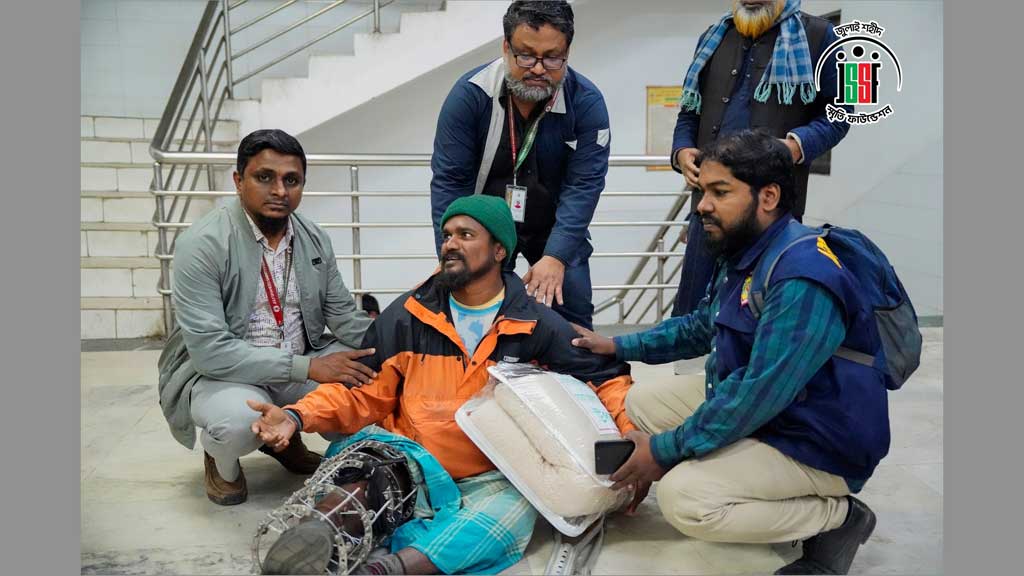
In the case of injured individuals, applicants must fill out a grant request form. Each case is reviewed and verified to confirm whether the applicant was genuinely injured in the uprising. Only then is financial support released.
According to the foundation, it has so far provided Tk 500,000 each to the families of 806 out of the 834 officially recognised martyrs. Among the government-listed injured, 6,691 people have received financial assistance out of a total of 8,768 applicants.
WOUNDED SURVIVORS VOICE FRUSTRATION
Those injured in the July Uprising have been categorised into three groups: A, B, and C –meaning critically injured, seriously injured, and injured, respectively.
Category A recipients are entitled to Tk 400,000 in two phases: Tk 100,000 initially and another Tk 300,000 later. Category B recipients are to receive a total of Tk 300,000; Tk 100,000 first, followed by Tk 200,000. Those in Category C are supposed to receive Tk 2 00,000 in two equal instalments.
Despite this structure, many wounded fighters say they have yet to receive their full entitlements. Some report frequent delays, miscommunication, or partial payments, while others have resorted to personally visiting the foundation’s office in frustration—sometimes resulting in minor altercations.
Mohammad Rubel, from Isdair in Narayanganj, was hit by shotgun pellets on Jul 19, 2024 and again on Aug 4, this time in the eye and head. He has since lost vision in his left eye and still carries pellets lodged in his brain.
Treated at the Combined Military Hospital in Dhaka, Rubel now lives at home and occasionally visits for follow-ups.
Speaking to bdnews24.com, Rubel said he has been under government care since Aug 9 last year. Before that, he had to pay for treatment out of his own pocket. He was supposed to receive Tk 400,000 from the July Foundation but has received only Tk 300,000 so far.
“They gave me the first Tk 100,000 in October last year and Tk 200,000 in March this year,” he said. “Another 100,000 was promised, but now the foundation says they have no funds. So I’ve stopped going. And after that fight broke out at the office, I didn’t feel safe going back. They’ve done nothing about my rehabilitation either.”
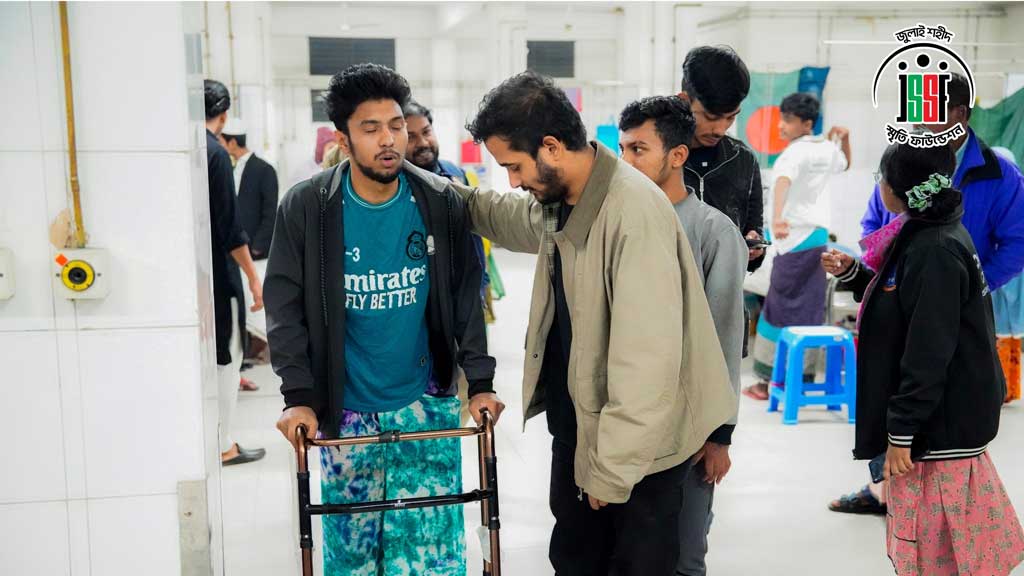
Mizanur Rahman, a college student from Sylhet, was blinded in his right eye after being hit by rubber bullets during the uprising on Aug 4 in Bondorbazar. His left eye is also deteriorating.
He said the July Foundation has so far given him Tk 300,000 in two instalments, and he has received an additional Tk 200,000 from the Ministry of Liberation War Affairs.
“The process of getting aid is painfully slow,” said Mizanur. “They take too long. It took one and a half months just to process one person’s application. I waited three months for my first cheque. Most of us have no money. We come from poor families.”
On Aug 5 — the day the Awami League government fell — student Nafisa Hossain Marwa was shot dead by police in Savar. Her father Abul Hossain said, “Whatever the government has done for us, it didn’t have to. But what it is doing now can’t be called satisfactory either.”
“What can we even do with the compensation?” he asked. “Most families are in dire straits; no home, no land. We were given a savings certificate worth Tk 1 million, and from that, we receive Tk 9,300 a month.”
FROM FRUSTRATION TO FURY
On Jul 8, a group of angry wounded fighters stormed the office of the July Martyrs’ Memorial Foundation in Shahbagh. According to the foundation’s Chief Executive Kamal Akbar, the attack was fuelled by delays in disbursing the second instalment of financial aid.
The foundation’s management of funds has also come under public scrutiny. Umama Fatema, former central coordinator of the anti-discrimination movement, criticised the organisation for failing in its core responsibility.
Writing on Facebook the night of the incident, she said, “Although the foundation was set up to serve the families of martyrs and the wounded, it has completely failed in fulfilling its duty. How funds came in, how they were distributed, how many received them and how many are still due — none of this is clear.
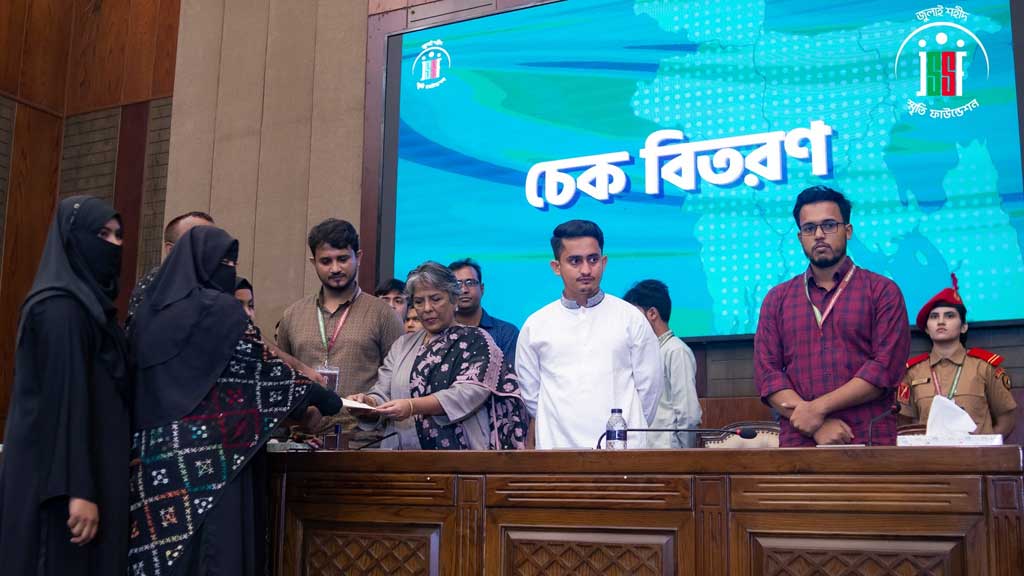
“More than half of the injured haven’t even received the first phase of assistance. And now the foundation’s office has been vandalised. Even a year after the uprising, they have not been able to finalise a list of the injured.
Continued Fatema: “The entire process is haphazard. The foundation must be handed over urgently to responsible and competent individuals who can truly stand beside the martyrs’ families and the wounded.”
FRAUDSTERS ON THE MOVE
There have also been allegations of fraud involving forged documents to claim benefits from the foundation, as well as embezzlement of funds meant for the injured.
A few individuals have been identified as having falsely entered the list of wounded using forged medical papers. In some cases, legal action has been taken.
In a letter to the Liberation War ministry in April, the foundation reported that several people had applied for aid claiming to have been injured in the July Uprising.
After screening, 19 of them were identified as not having been involved in the movement at all. They had submitted fake documents from private hospitals to support their claims.
The foundation formally requested that the ministry take action against the individuals involved in fraud. It also disclosed that at least 100 allegations of fund embezzlement involving aid for the wounded have been received.
One such victim is Abdus Salam Munna, who was shot by police in Narayanganj during the July protests last year. He said he received a cheque for Tk 100,000 in March this year, but half of it was taken by a woman posing as a “coordinator”.
“She took Tk 1,000 upfront as a processing fee when I submitted my documents. Since I didn’t have a bank account, she said she’d deposit the cheque into her aunt’s account and withdraw it on my behalf. But after withdrawing the money, she only gave me Tk 50,000 and kept the rest. When I asked for the rest, she told me she worked for us and wouldn’t return it.”
The accused, Dilshad Afrin, told bdnews24.com that she had been sued for allegedly embezzling Tk 90,000, but dismissed the case as part of a conspiracy.
“If I wanted to embezzle, I could’ve made billions. Many of the actual coordinators are doing just that. I wasn’t even an official of the foundation, so how could I have misappropriated foundation funds? I know who did, but I don’t want to name names right now.”
FOUNDING LEADERS STEP DOWN
Initially, the general secretary of the July Foundation was Snigdho, the twin brother of slain protester Mugdha. Later, anti-discrimination activist Sarjis Alam took over as general secretary, and Snigdho became the foundation’s CEO.
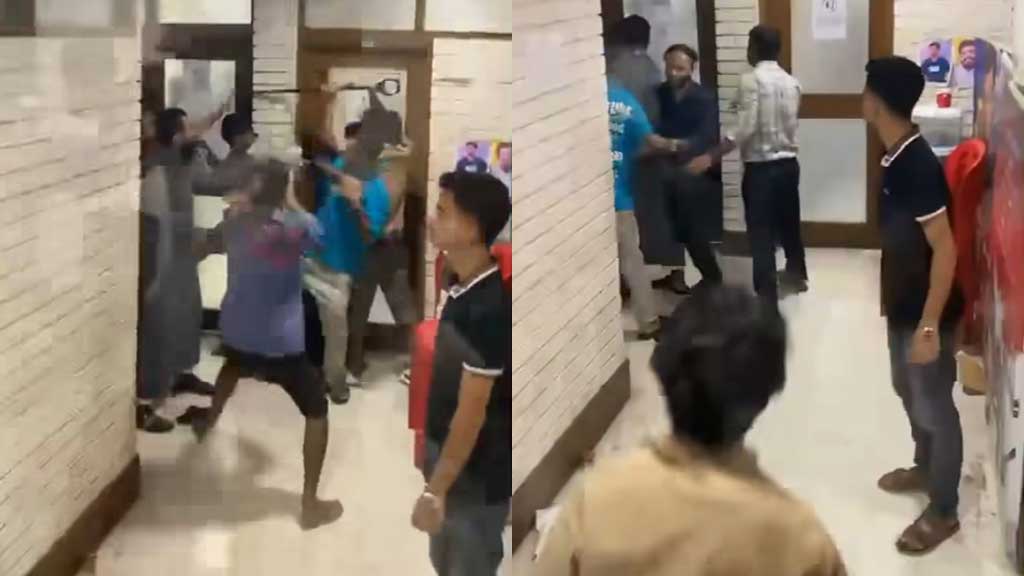
On Jan 22 this year, Sarjis stepped down from his post, citing an inability to give the position the time it required.
Three months later, Snigdho also resigned as CEO. He said that when he had taken over, the foundation was in a “post-war state” and that he left only after the situation had stabilised.
“We had to step up to help get the foundation off the ground. Nine months after the uprising, I felt the foundation had reached a certain stage, it was ‘on the track’, so to speak. Now, it’s just a matter of driving it well.
“Also, I have personal obligations, my Master’s degree is pending and I need to return to my studies. That’s why I decided to resign. There was no conflict or controversy involved.”
Reflecting on his time at the foundation, Snigdho said he had faced numerous challenges. “There were fraud rings trying to get names listed in the aid registry. We faced bureaucratic hurdles in reaching the injured. Some hospitals were reluctant to provide treatment. Even rehabilitation posed serious obstacles.”
He said efforts were made to help injured individuals find employment in both the public and private sectors, but many families held out for government jobs.
“We managed to secure many private sector jobs and made offers, even released application forms. But their first question was always: ‘Is it a government job?’ If it was private, they’d lose interest completely.”
TREATMENT, REHABILITATION KEY CHALLENGES
Speaking to bdnews24.com, current CEO Akbar said the foundation began its work facing multiple challenges. At present, two major hurdles remain: ensuring medical care and facilitating rehabilitation.
“The wounded are in a psychological space that they’re struggling to accept. Helping them recover from this mental state is a massive challenge.”
He added, “If we fail to address this, there will be a huge gap between what they expect and what they receive. Someone who has lost a leg or an arm often becomes a burden on their family. Many injured individuals have been abandoned by their spouses.”
“Each person’s story is heartbreaking, we’re only seeing a part of it. Helping these people stay stable and providing them financial aid is crucial, even though we currently lack the funds.”
Akbar said the foundation is collaborating with others to support rehabilitation. The July Foundation has started working with the SME Foundation and the ICT Division. Some of the injured have already begun training programmes.
“Since Sunday, a group of 12 has begun training at BKSP. After completing it, they’ll have the chance to qualify for the Paralympics. Another training session for members of martyr families and the wounded will start Tuesday morning, organised by the SME Foundation, with 20 women participating.
“So far, 1,700 people have been registered for training by the ICT Division, and that programme is also about to begin.”
In response to a question, CEO Akbar said there is no financial opacity within the July Foundation.
“Our accounts have been audited. People say many things outside, but what happens inside is often very different. The previous CEO had to operate during wartime conditions, which made the job difficult. No one has run off with the money.”
